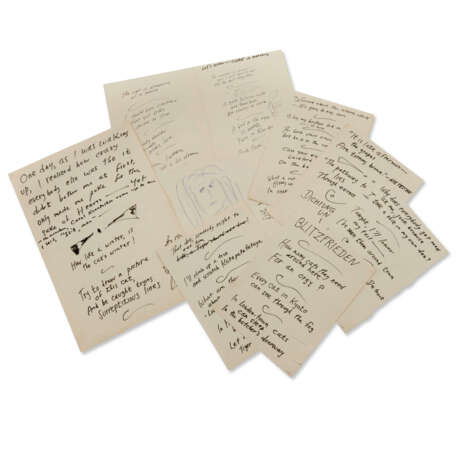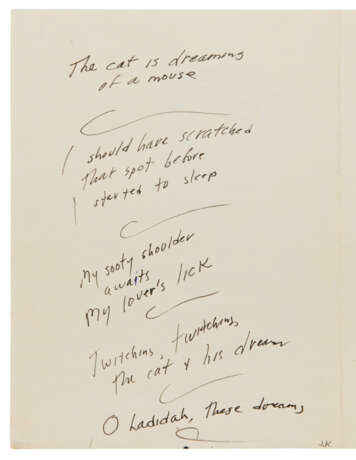ID 1108912
Lot 113 | Jack Kerouac (1922-1969) and Stanley Twardowicz (1917-2008)
Estimate value
£ 10 000 – 15 000
Autograph manuscript haïkus and drawings, [Northport, New York], [1963]
11 pages of haïkus and verse fragments by Jack Kerouac on 9 leaves, 305 x 230mm and 460 x 305mm (2), most with sketched portraits in felt-tip pen or biro on the verso, some of these fragmentary, one verse fragment and some of the drawings by Kerouac's friend Larry Smith, annotated initials ('J.K.' and 'L.S.') added to each page by way of attribution. [With:] Stanley Twardowicz. Untitled drawing, ?portrait of Kerouac, signed and dated ('S. Twardowicz. 64'), ink on craft paper. 450 x 300mm. [And:] Larry Smith. Photograph of Jack Kerouac and Stanley Twardowicz, 1964, modern reproduction. Provenance: Stanley Twardowicz (1917-2008, American painter) – Sotheby's New York, 18 June 1987, lot 101 –Sotheby's New York, 19 June 2015, lot 62.
Unpublished cat haïkus by Jack Kerouac, spontaneously composed at a party in 1963, with a drawing by Stanley Twardowicz, who preserved these verses. In an inscription on the back of the photograph, Stanley Twardowicz explains the origin of these haïkus: 'In 1963, Jack Kerouac [...] Larry Smith and his wife Tsuneko, artist Matsumi Kanemitsu [...] and I had a party [...] During the evening, Matsumi mentioned to Jack that he was doing a book of drawings on cats and suggested to Jack to write some haïkus to be included in the book. Jack was excited about the idea and asked me for pen and paper and spent the rest of the evening writing haïkus, doing drawings of cats and of me and friends'.
Kerouac discovered haïkus after he was introduced to Buddhism by his friend, the poet Gary Snyder, and later developed his own approach to the form, the 'Western Haïku'.
| Artist: | Jack Kerouac (1922 - 1969) |
|---|---|
| Place of origin: | USA |
| Artist: | Jack Kerouac (1922 - 1969) |
|---|---|
| Place of origin: | USA |
| Address of auction |
CHRISTIE'S 8 King Street, St. James's SW1Y 6QT London United Kingdom | |||||
|---|---|---|---|---|---|---|
| Preview |
| |||||
| Phone | +44 (0)20 7839 9060 | |||||
| Buyer Premium | see on Website | |||||
| Conditions of purchase | Conditions of purchase |







